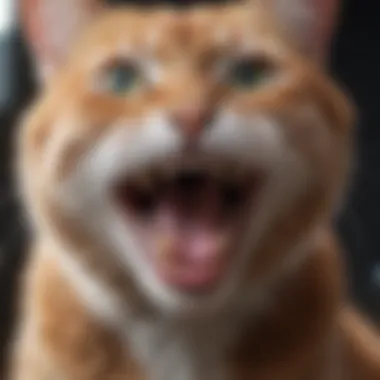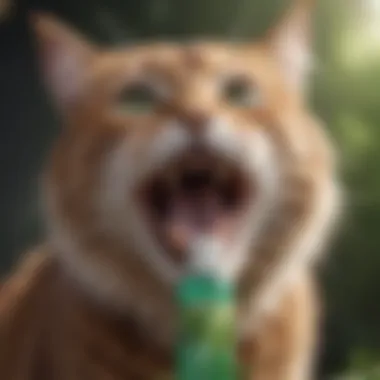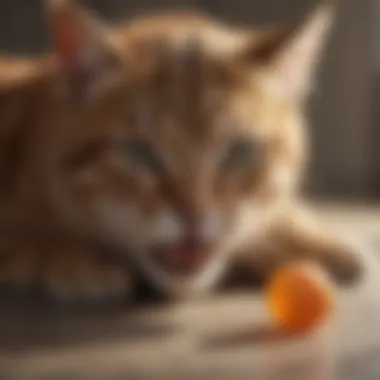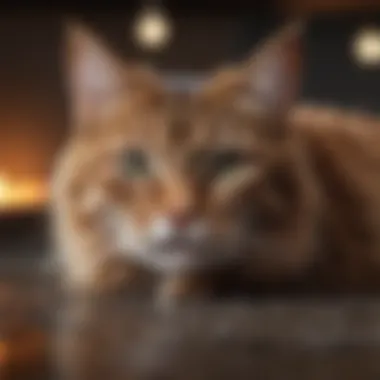Discover Effective Home Remedies for Cat Gingivitis to Improve Your Pet's Dental Health


Pet Care Essentials
Cat gingivitis is a common dental issue that impacts our feline companions. To effectively address and manage this condition at home, it is crucial to focus on their daily nutrition requirements. Ensuring that your cat receives a balanced diet rich in essential nutrients and vitamins can play a significant role in supporting their overall dental health. Additionally, providing healthy treats that promote dental hygiene can aid in preventing gingivitis.
When it comes to exercise and playtime, engaging your feline friend in regular physical activities can contribute to their overall well-being. Interactive toys that encourage chewing and biting can help keep their teeth and gums healthy. Furthermore, incorporating play sessions that stimulate their natural hunting instincts can also promote dental health.
Grooming tips are integral to maintaining your cat's oral hygiene. Regular brushing with feline-specific toothbrushes and toothpaste can help prevent plaque buildup and reduce the risk of gingivitis. Introducing grooming routines early on can make the process more comfortable for your cat, promoting better oral health in the long run.
Regular health and wellness check-ins are essential for monitoring your cat's overall health, including their dental condition. Scheduling routine veterinary exams can help detect early signs of gingivitis, allowing for prompt intervention and treatment. By staying proactive and observant, cat owners can address potential dental issues before they escalate.
Understanding Cat Gingivitis
Cat gingivitis is a prevalent dental issue among felines that can significantly impact their overall health and well-being. Understanding the causes, symptoms, and treatment options for cat gingivitis is crucial for responsible pet owners. By delving into the specifics of this condition, individuals can better address and manage their cat's oral health. This article aims to provide a comprehensive guide to effectively handling cat gingivitis through home treatments and preventative measures.
Causes of Cat Gingivitis
Poor dental hygiene
Poor dental hygiene in cats can lead to a buildup of plaque and bacteria on their teeth and gums. This accumulation can result in inflammation, bleeding, and potentially more severe dental issues. Neglecting to maintain proper oral hygiene for cats can significantly increase the risk of developing gingivitis. Regular brushing and dental care are essential to prevent and manage this condition.
Dietary factors
The diet of a cat plays a crucial role in their oral health. Consuming sugary or carb-heavy foods can contribute to dental issues like gingivitis. Providing high-quality, dental-friendly food can help promote healthier teeth and gums in cats. Additionally, avoiding human food that may be harmful to feline dental health is important in preventing gingivitis and related problems.
Dental abnormalities
Some cats may experience dental abnormalities that predispose them to gingivitis. Irregularities in tooth alignment, missing teeth, or other oral issues can create a breeding ground for bacteria and plaque. Understanding and addressing these dental abnormalities early on can help mitigate the risk of gingivitis development and ensure better oral health for felines.


Symptoms to Watch For
Bad breath
One of the initial signs of cat gingivitis is persistent bad breath. Foul odors emanating from a cat's mouth can indicate bacterial presence and dental inflammation. Monitoring and addressing bad breath in cats promptly can help in early detection and management of gingivitis.
Swollen or bleeding gums
Swelling and bleeding of the gums are common indicators of gingivitis in cats. Inflamed gums that bleed easily, especially during brushing or eating, should be a cause for concern. Careful examination of the gums can reveal the presence of gingivitis and prompt the necessary steps for treatment.
Difficulty eating
Cats experiencing gingivitis may find it challenging to eat due to pain and discomfort in their mouths. Changes in eating behaviors, reluctance to chew hard food, or dropping food while eating can signal oral issues requiring attention. Addressing difficulties in eating promptly can prevent further complications and improve the cat's quality of life.
Preventative Measures
Preventative measures play a crucial role in addressing cat gingivitis. By incorporating preventive strategies, cat owners can proactively safeguard their feline companions' dental health. Regular brushing and dietary adjustments are key components of effective preventive care. Regular brushing helps remove plaque buildup and prevent gum inflammation. Using pet-specific toothpaste is ideal for oral hygiene, as it is formulated to suit cats' needs, considering their unique oral environment. Introducing brushing gradually to cats is essential to ensure they become accustomed to the process, reducing stress and promoting cooperation. Dietary adjustments, such as feeding high-quality, dental-friendly food, contribute significantly to oral health. These specially formulated diets aid in reducing tartar formation and supporting overall dental wellness. Avoiding human food is imperative, as it may contain ingredients harmful to cats' dental health, such as sugars and additives.
Regular Brushing
Maintaining a regular brushing routine is essential for preventing and managing cat gingivitis effectively. Ideally using pet-specific toothpaste is a game-changer in cat dental care. Pet-specific toothpaste is formulated with feline-friendly flavors and ingredients, enticing cats to accept the brushing process. The unique formula is safe for ingestion, ensuring cats' well-being even if they swallow it during brushing. Introducing brushing gradually to cats is necessary, especially if they are not accustomed to dental care. By easing cats into the routine slowly, pet owners can minimize resistance and create a positive association with brushing. This approach enhances compliance and allows for thorough cleaning without causing distress to the cat.
Ideally using pet-specific toothpaste
Ideally using pet-specific toothpaste enhances the brushing experience for both cats and owners. The gentle formulation is tailored to cats' sensitive oral tissues, reducing the risk of irritation or adverse reactions. Its pleasant flavors, such as fish or chicken, appeal to cats, making the brushing routine more enjoyable. Unlike human toothpaste, which may contain substances toxic to cats, pet-specific toothpaste is safe for feline use, providing peace of mind to pet owners. Additionally, the enzymatic action of pet toothpaste helps combat plaque and tartar effectively, promoting better oral health in cats.
Introducing brushing gradually


Introducing brushing gradually is a vital aspect of feline dental care. Cats are known for their sensitivity to changes in routine, especially when it involves handling their mouths. By slowly introducing the concept of brushing, starting with gentle touches and positive reinforcement, cats can acclimate to the process with less stress and resistance. Gradual introduction allows cats to feel comfortable and secure during brushing sessions, fostering a trusting bond between the cat and the owner. Over time, cats become more receptive to dental care, easing the maintenance of their oral hygiene.
Dietary Adjustments
Dietary adjustments play a significant role in maintaining cats' oral health and combating gingivitis. Opting for high-quality, dental-friendly food can support dental hygiene by reducing plaque and tartar accumulation. Specialized dental diets contain ingredients that help scrape off tartar and promote gum health, contributing to overall oral wellness. Avoiding human food is crucial, as many human foods can be harmful to cats' teeth and gums. Human foods often contain sugars and preservatives that can lead to dental issues in cats. By sticking to a balanced and cat-friendly diet, pet owners can proactively protect their cats' dental health and prevent gingivitis.
High-quality, dental-friendly food
High-quality, dental-friendly food is a cornerstone of good oral health for cats. These specialized diets are formulated to support dental hygiene by incorporating ingredients that help reduce tartar formation and maintain gum health. The kibble's size and texture are designed to promote chewing, aiding in mechanical plaque removal. The balanced nutrition provided by dental diets supports overall health and vitality while targeting specific dental concerns. Regular consumption of high-quality, dental-friendly food can significantly reduce the risk of developing gingivitis and other dental problems in cats.
Avoiding human food
Avoiding human food is essential for preserving cats' dental health. Human foods often contain additives, sugars, and spices that can be detrimental to feline oral hygiene. Feeding cats human food can lead to dental issues such as plaque buildup, gum inflammation, and bacterial growth. By refraining from offering human foods to cats, pet owners can minimize the risk of dental problems and ensure their cats receive nutrition that promotes oral wellness. Choosing cat-specific diets over human foods is a proactive step toward maintaining healthy teeth and gums in felines.
Natural Remedies
Natural remedies play a pivotal role in addressing the issue of cat gingivitis, offering holistic and gentle solutions for this common dental problem in felines. In this article, the focus on natural remedies aims to provide cat owners with alternative approaches that can complement conventional treatments. By exploring natural remedies, cat owners can opt for methods that are gentle on their pets while still effective in managing gingivitis. The significance of natural remedies lies in their ability to harness the healing properties of natural substances, offering a more organic and potentially side-effect-free approach to oral health for cats.
Coconut Oil Pulling
Coconut oil pulling stands out as a popular natural remedy for cat gingivitis due to its antibacterial properties and anti-inflammatory benefits. The antibacterial properties of coconut oil help combat the harmful bacteria that contribute to gingivitis, promoting healthier gums and preventing the progression of the condition. This characteristic makes coconut oil an ideal choice for this article as it aligns with the objective of exploring effective yet natural ways to manage cat gingivitis. Furthermore, the anti-inflammatory benefits of coconut oil reduce inflammation in the gums, soothing discomfort and supporting the healing process. While discussing coconut oil pulling, it is essential to highlight its unique feature of being safe for cats to ingest, ensuring ease of application and potential oral health benefits, a crucial aspect for consideration in this article.
Antibacterial properties
Coconut oil's antibacterial properties are key in combating the bacteria responsible for causing gingivitis in cats. This specific aspect of coconut oil is crucial for addressing the root cause of the condition, as it helps eliminate harmful bacteria in the oral cavity. The antibacterial properties of coconut oil provide a natural and gentle alternative to chemical-based oral care products, making it a popular choice among cat owners seeking natural remedies for their pets. Despite its effectiveness, it is important to note that coconut oil, like any treatment, may have limitations and individual reactions depending on the cat's health status.
Anti-inflammatory benefits


The anti-inflammatory benefits of coconut oil contribute significantly to managing cat gingivitis by reducing inflammation in the gums. This particular aspect of coconut oil is essential for alleviating discomfort and promoting healing in inflamed gum tissues. By incorporating coconut oil for its anti-inflammatory properties, cat owners can provide symptomatic relief to their pets while addressing the underlying inflammation associated with gingivitis. However, as with any treatment, it is crucial to consider individual sensitivities and preferences when determining the efficacy of coconut oil for each cat's unique oral health needs.
Chlorophyll Supplements
Chlorophyll supplements offer detoxifying effects and promote oral health, making them a valuable addition to the natural remedies discussed in this article. The detoxifying effects of chlorophyll help cleanse the oral cavity by neutralizing toxins and bacteria, contributing to improved oral hygiene in cats. This aspect of chlorophyll supplements aligns well with the overall goal of combating gingivitis naturally, as detoxification plays a crucial role in reducing bacterial load and supporting gum health. Moreover, chlorophyll's ability to promote oral health by maintaining a healthy microbial balance in the mouth further reinforces its relevance in the context of cat gingivitis management.
Detoxifying effects
The detoxifying effects of chlorophyll are instrumental in purifying the oral environment, removing harmful substances that can contribute to the development and progression of gingivitis in cats. This specific aspect of chlorophyll supplements aids in reducing bacterial colonization and promoting a healthier oral microbiome, essential for preventing oral diseases. By integrating chlorophyll supplements for their detoxifying effects, cat owners can support their pets' oral health naturally, complementing traditional dental care practices. It is important to note that while chlorophyll offers detoxification benefits, individual responses and tolerance levels may vary, warranting careful observation when introducing this supplement to cats.
Promotes oral health
Chlorophyll's ability to promote oral health stems from its capacity to balance microbial populations in the mouth, fostering an environment conducive to gum health and overall oral well-being in cats. This key characteristic of chlorophyll supplements contributes to maintaining a harmonious oral ecosystem, reducing the risk of plaque formation and bacterial overgrowth that can lead to gingivitis. By promoting oral health through its natural properties, chlorophyll supplements offer a preventive approach to oral care, emphasizing the importance of holistic interventions in managing cat gingivitis. While chlorophyll's role in promoting oral health is valuable, individual cat preferences and responses should guide its usage to ensure optimal results and minimal adverse effects.
Professional Intervention
Professional intervention plays a crucial role in the comprehensive management of cat gingivitis. When home treatments and preventive measures are insufficient to address the severity of the condition, seeking professional help becomes imperative. Veterinarians possess the expertise and tools to perform interventions that are beyond the scope of home care. By entrusting the oral health of your feline companion to a professional, you are ensuring a higher level of care that can lead to long-term health benefits.
Dental Cleaning
As a pivotal component of professional intervention, dental cleanings conducted by a veterinarian are indispensable in combating cat gingivitis. Scheduled cleanings involve a thorough removal of plaque, tartar, and bacteria that accumulate on the teeth and gums, contributing to the progression of gingivitis. These cleanings are performed under anesthesia to ensure a comprehensive and stress-free procedure. The meticulous cleaning process targets areas that are unreachable through regular brushing, promoting optimal oral hygiene and preventing the advancement of gingivitis.
Scheduled Cleanings with a Veterinarian
Scheduled cleanings with a veterinarian are essential for maintaining your cat's oral health. Veterinarians have the specialized knowledge and skills to assess the extent of gingivitis and tailor the cleaning procedure accordingly. The frequency of these cleanings may vary depending on the severity of the condition, with some cats requiring more frequent visits than others. Regular cleanings not only address existing issues but also serve as a proactive measure to prevent future dental problems. The thoroughness of professional cleanings ensures a deep cleanse that significantly reduces the risk of gum disease and tooth decay, promoting overall well-being.
Surgical Options
In cases where cat gingivitis has progressed significantly, surgical options like tooth extractions may be necessary to alleviate pain and prevent further oral deterioration. Despite being a last resort, surgical intervention can be a life-saving measure for cats whose oral health is severely compromised by advanced stages of gingivitis. Tooth extractions can effectively remove diseased teeth that are beyond repair, eliminating a potential source of infection and discomfort. While surgery may seem daunting, it is a vital solution in instances where non-invasive treatments have proven insufficient.
Tooth Extractions If Necessary
Tooth extractions represent a critical aspect of surgical options for cat gingivitis. When a tooth is extensively damaged by gum disease or decay, extracting it becomes necessary to prevent the spread of infection and alleviate pain. Veterinarians perform tooth extractions under anesthesia to ensure the comfort and safety of the cat throughout the procedure. While losing a tooth can be concerning, the removal of severely affected teeth is crucial for restoring oral health and enhancing the cat's quality of life in the long run. Surgical intervention, including tooth extractions, serves as a definitive measure to address severe cases of cat gingivitis, promoting improved oral hygiene and overall health outcomes.







